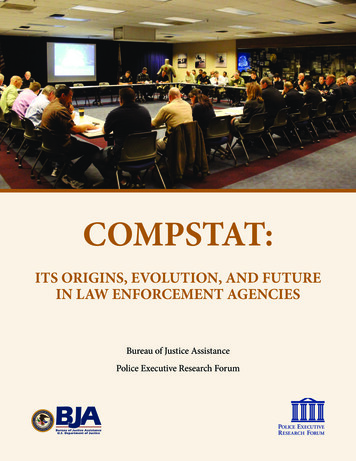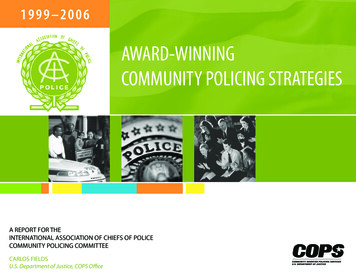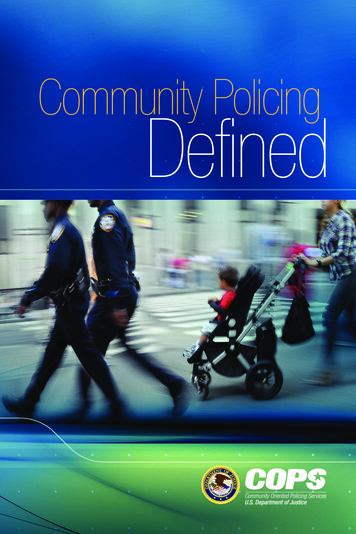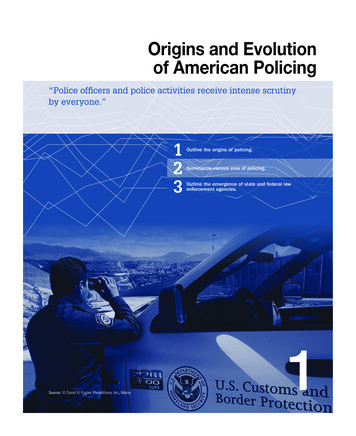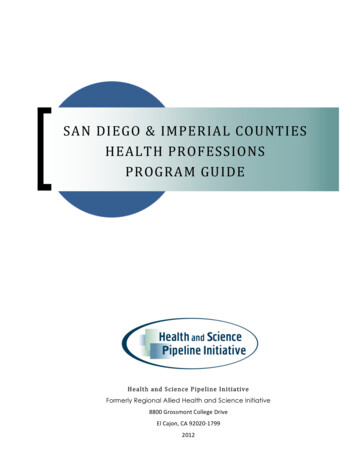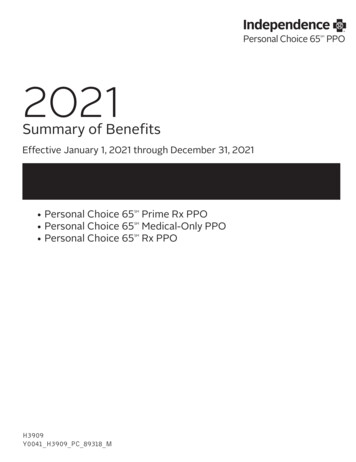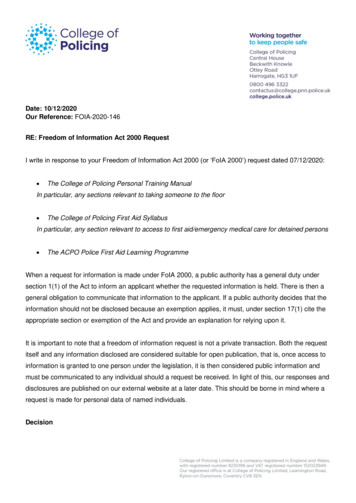
Transcription
Date: 10/12/2020Our Reference: FOIA-2020-146RE: Freedom of Information Act 2000 RequestI write in response to your Freedom of Information Act 2000 (or ‘FoIA 2000’) request dated 07/12/2020: The College of Policing Personal Training ManualIn particular, any sections relevant to taking someone to the floor The College of Policing First Aid SyllabusIn particular, any section relevant to access to first aid/emergency medical care for detained persons The ACPO Police First Aid Learning ProgrammeWhen a request for information is made under FoIA 2000, a public authority has a general duty undersection 1(1) of the Act to inform an applicant whether the requested information is held. There is then ageneral obligation to communicate that information to the applicant. If a public authority decides that theinformation should not be disclosed because an exemption applies, it must, under section 17(1) cite theappropriate section or exemption of the Act and provide an explanation for relying upon it.It is important to note that a freedom of information request is not a private transaction. Both the requestitself and any information disclosed are considered suitable for open publication, that is, once access toinformation is granted to one person under the legislation, it is then considered public information andmust be communicated to any individual should a request be received. In light of this, our responses anddisclosures are published on our external website at a later date. This should be borne in mind where arequest is made for personal data of named individuals.Decision
After conducting careful searches for any information relevant to your request I can confirm that we holdthe information requested.The first part of your request has previously been dealt with under FOIA-2020-0110 and can be foundhere: FOIA-2020-0110. The manual is readily accessible through the College library but has beenredacted as per s31 of the FOIA 2000.For parts two and three of your request please see the subsequent pdf attachment. Please note theNPCC replaced ACPO, and the NPCC is noted within the document.I trust this letter answers your questions. Your rights are provided in Appendix A.Yours sincerely,James Rose Legal AdvisorInformation Management and Legal TeamCollege of PolicingEmail: e.uk
Appendix ARightsIf you are dissatisfied with the handling procedures or the decision of the College of Policing made underthe Freedom of Information Act 2000 (the Act) regarding access to information you can request that thedecision is reviewed internally.Internal review requests should be made in writing, within forty (40) working days from the date of therefusal notice, and addressed to: FOI team, Central House, Beckwith Knowle, Otley Road, Harrogate,North Yorkshire, HG3 1UF or email: FOI@college.pnn.police.ukIn all possible circumstances the College of Policing will aim to respond to your request for internal reviewwithin 20 working days.The Information CommissionerIf, after lodging an internal review request with the College of Policing you are still dissatisfied with thedecision you may make application to the Information Commissioner for a decision on whether the requestfor information has been dealt with in accordance with the requirements of the Act.For information on how to make application to the Information Commissioner please visit their website mation/.Alternatively, write to:Information Commissioner's OfficeWycliffe HouseWater LaneWilmslowCheshireSK9 5AFPhone: 0303 123 1113
National Programme SpecificationProgramme title: First Aid Learning ProgrammeVersion number 3.0October 2020
Programme SpecificationProgramme title: First Aid Learning Programmecollege.police.ukCollege of Policing LimitedLeamington RoadRyton-on-DunsmoreCoventry, CV8 3EN – College of Policing Limited (2020)All rights reserved. No part of this publication may be reproduced, modified,amended, stored in any retrieval system or transmitted, in any form or by any means,without the prior written permission of the College or as expressly permitted by law.Anyone wishing to copy or reuse all or part of this publication for purposes other thanexpressly permitted by law will need a licence. Licence applications can be sent tothe College’s Intellectual Property Rights (IPR) and Licensing Manager atDiane.Kennedy@College.pnn.police.ukWhere we have identified any third-party copyright material you will need permissionfrom the copyright holders concerned. This publication may contain public sectorinformation licensed under the Open Government Licence v3.0 licence/version/3/For any other enquiries regarding this publication, please email us police.ukThis document has been created with the intention of making the content accessibleto the widest range of people regardless of disability or impairment. To enquire abouthaving this document provided in an alternative format, please email us police.ukENPS FA PS 001 PDFVersion 3.0Page 2 of 23
Programme SpecificationProgramme title: First Aid Learning Programmecollege.police.ukContentsProgramme definition . 4Health and Safety Executive legal requirements . 4Quality assuring FALP . 4FALP modules . 5Clinical governance . 7National police firearms and public order requirement for first aid learning . 8Aim and outcomes of learning . 8Learning structure/target audience . 9Programme entry requirements . 11Prior experience . 11Learning delivery. 11E-learning . 11Learning resources . 12Trainer/instructors requirements . 12Assessor requirements . 12Assessment of the learning . 13Assessment resources. 14Policing professional context . 14National governance of first aid . 14Professional registration . 15Appendix one – High level learning outcomes mapping . 16ENPS FA PS 001 PDFVersion 3.0Page 3 of 23
Programme SpecificationProgramme title: First Aid Learning Programmecollege.police.ukProgramme definitionThe First Aid Learning Programme (FALP) was approved by the National PoliceChiefs Council (NPCC) lead for first aid and the Health and Safety Executive (HSE).The first aid Quality Partnership commenced its role in 2019 as a first aid lead bodyworking in conjunction with the HSE). This body now represents the HSE as theindustry lead in workplace first aid training. The minimum standards and qualityassurance processes set out in this document have been agreed by the HSE.Health and Safety Executive legal requirementsForces are advised to ensure their first aid training is always current and aligns toHSE guidelines. The current guidelines can be found at: https://www.hse.gov.uk.Regulation 3, Duty of employer to make provision for first-aid (1) – (5) in the Healthand Safety (First-Aid) Regulations 1981, sets out the essential aspects of first aidthat employers have to address.Forces have the responsibility to ensure the training staff or training provider aretrained to the recognised HSE standards of Emergency First Aider at Work (EFAW)and First Aider at Work (FAW) as set out in the HSE guidance ‘Selecting a first-aidtraining provider – A guide for employers’ 2013 GEIS3.(The https://www.hse.gov.uk.)In October 2013, the HSE ceased direct responsibility for licensing training providersto deliver EFAW and FAW training. It however continues to have a role inmaintaining overall standards for first aid training.Quality assuring FALPThe HSE delegated responsibility to training organisations, to have quality assurancemechanisms in place that support the effective implementation of the principles setout in a document called ‘Selecting a first-aid training provider. A guide foremployers’ referred to as ‘HSE guidelines 2013 GEIS3’. The College of Policing (theCollege) on behalf of the National Policing Business Area for Health, Safety andWelfare is responsible for ensuring appropriate quality assurance processes are inplace to guide forces in implementing the HSE guidelines. This document has beenENPS FA PS 001 PDFVersion 3.0Page 4 of 23
Programme SpecificationProgramme title: First Aid Learning Programmecollege.police.ukmapped to HSE guidelines to support forces in meeting their legal obligations indelivering this learning. There is another document owned by the College, called theFALP Guidance. It describes in detail how forces can evidence compliance againstthe HSE requirements via the Police Service Quality Assurance scheme (PSQA).This document can be found on the College’s Managed Learning Environment(MLE). The National Policing lead has endorsed the current first aid modules 2 and 4to comply with the HSE requirements. And meet the legal minimum requirements inthe delivery of the initial training to qualify as a first aider and annual refreshertraining for first aiders in policing.FALP modulesThe HSE (First-Aid) Regulations 1981 recommend that employers should considermembers of the public when undertaking an assessment of needs for first aidprovision. This recommendation of ‘considering the public’ can be interpreted asthose affected by the policing role and functions.FALP is made up of five modules as listed below. The learning standards for eachmodule provide the learning required for specific roles within a policing context.These modules are defined in the National Curriculum learning standards. Thelearning standards are aligned to the relevant HSE training standards pertaining tofirst aid.Module 1: Basic life supportThis module is designed for police personnel requiring knowledge of basicemergency procedures. The learning provides basic first aid principles andprocedures.Module 2: First aid skills police; (also called HSE emergency first aider atwork). Annual refresher training is required in this module.This module is designed for police officers and operational support staff who havedirect contact with the public. The learning addresses a range of medical situationsthat personnel may be expected to deal with. This module includes the learningoutcomes addressed in Module 1, Basic Life Support.ENPS FA PS 001 PDFVersion 3.0Page 5 of 23
Programme SpecificationProgramme title: First Aid Learning Programmecollege.police.ukModule 3: First aid skills custodyThis module is designed for police officers such as, custody sergeants, detentionofficers and includes other relevant personnel who are responsible for the care ofdetainees, as determined by the force.The learning addresses a range of medical situations that personnel working in acustody environment are more likely to encounter. This module supplementsModule 2.Module 4: First aid at work (HSE FAW); initial and requalificationThis module is designed for officers or police staff working in medium to high riskareas where the operational plan requires a higher level of first aid than theemergency first aider can provide. It focuses on the level of first aid identified by theHSE as the acceptable level for medium to high risk work environments andoperational duties.The learning addresses a wide range of medical situations that personnel may beexpected to deal with. It addresses the same content as Module 2, however itdevelops this further by adding more complex medical and trauma skills.Annual refresher training is required as defined in Module 4; Refresher Training.Module 5: Enhanced first aid skillsThis module is designed for specific roles such as firearms and public order policepersonnel who are non-health care professionals working in high risk environments.This learning supplements the basic foundation first aid skills.This module offers a menu of enhanced first aid skills that the National First AidForum has been advised are suitable for police personnel who are non-health careprofessionals. The Faculty of Pre-Hospital Care-Royal College of SurgeonsEdinburgh has defined the content of this module as achievable and legallyappropriate for the police service.This learning has been designed in addition to basic foundation first aid skills,appropriate to role requirements (Modules 1 Basic Life Support, 2 First Aid SkillsPolice (Emergency First Aider at Work) or 4 First Aid at Work Police), and should notbe taught in isolation. Annual refresher training is required.ENPS FA PS 001 PDFVersion 3.0Page 6 of 23
Programme SpecificationProgramme title: First Aid Learning Programmecollege.police.ukSelecting the appropriate enhanced skills course should be on the basis of a riskassessment where: the role requirements dictate an enhanced level of skill the risk of injury to officers and public is high there are delays in healthcare provision reaching the casualty operational tactics or area is remote or difficult to reach there are known risks, such as the possibility of a death in custody specialist equipment is available for useClinical governanceClinical governance is a simple process that ensures first aid care is controlled andcarried out using a quality assurance process approach. Forces must work inpartnership with their local Clinical Advice Panel. The process should be overseenby a trauma expert, to advise the Chief Constable in their decisions on first aid care,ensuring that officers/staff are giving a suitable standard of care to injured people.The local clinical governance panel should also guide the Chief Constable in theselection of any additional skills required locally where they are not identified in themodule. Chief Constables are responsible for establishing the local clinical advicearrangements.Where additional learning and skills beyond the remit of this module are identifiedthrough local clinical governance, these must be referred to the National ClinicalGovernance Panel for approval.The Panel have the role of advising on the correct skills and equipment neededlocally to undertake first aid in particular policing roles and operations. The localClinical Advice Panel must agree the assessment requirements for Module 5Enhanced Skills.The quality assurance process must incorporate an effective communication channelbetween the local Clinical Advise Panel and the forces learning and developmentdepartment. This will ensure all parties are always aware of updates and thenecessary changes required and implemented.ENPS FA PS 001 PDFVersion 3.0Page 7 of 23
Programme SpecificationProgramme title: First Aid Learning Programmecollege.police.ukNational police firearms and public orderrequirement for first aid learningThe National Police Firearms Training Curriculum defines the ‘standard’ and‘enhanced’ first aid skills requirements for firearms officers. These requirements areintegrated in the First Aid learning outcomes and are referred to as D13 1 or D13 2.The learning should be taught in a firearms context. The D13 1 and D13 2 learningoutcomes are cross referenced in appendix one.The Public Order Medics First Aid training should also be taught in a public ordercontext and the content of the training should reflect the learning outcomes for F3which are also referenced in appendix one.Aim and outcomes of learningThe aim is to help learners develop knowledge, attitude and behaviours necessary incarrying out their role, in order to provide an appropriate response to first aid needsin their areas of operation.The learning outcomes for the five modules are within the national learningstandards for first aid. Details on what the learner will achieve on completion of eachmodule can be found on the College of Policing Managed Learning Environment(MLE) http://mle.ncalt.pnn.police.uk/ENPS FA PS 001 PDFVersion 3.0Page 8 of 23
Programme SpecificationProgramme title: First Aid Learning Programmecollege.police.ukLearning structure/target audienceThe table below indicates which role each element is primarily aimed at:The five modulesModuleRecommended1) Basic life2) First aid2) First aid3) First aid4) First aid at4) First aid at5) Enhancedsupportskills policeskills policeskills custodywork – initialwork re-skills– initial– refresher9 hrs4 hrs2 hrsqualification2 hrs18 hrs12 hrstraining timeVery low-riskLocallydefinedAnnuallyPublic contactYear 1officers/staffCustody staffENPS FA PS 001 PDFVersion 3.0Annually afterinitial trainingYear 1Annually afterAnnually inAnnually ininitial trainingaddition toaddition tomodule 2module 2Page 9 of 23
Programme SpecificationProgramme title: First Aid Learning Programmecollege.police.ukThe five modulesModule1) Basic life2) First aid2) First aid3) First aid4) First aid at4) First aid at5) Enhancedsupportskills policeskills policeskills custodywork – initialwork re-skills– initial– refresherMedium riskBetweenenvironmentsFAW trainingqualificationYear 1Every threeyears Year 4, 7, 10etcYear 2, 3, 5,6, 8, 9, etcHigh riskYear 1 asAs aboveYear 1 asAs aboveAnnually;environmentsappropriaterelevant toappropriaterelevant toselected skillsinitialinitialas As defined by the Health and Safety Executive and mapped to the National Policing Curriculum Learning Standards.ENPS FA PS 001 PDFVersion 3.0Page 10 of 23
Programme SpecificationProgramme title: First Aid Learning Programmecollege.police.ukProgramme entry requirementsDetails on pre-requisites and co-requisites for the five modules can be found on theCollege of Policing Managed Learning Environment (MLE) under Course catalogueshttp://mle.ncalt.pnn.police.uk/Prior experienceLearners should be appropriately trained, competent and authorised, according tothe role of the learning they are undertaking as described in modules 1, 2, 3, 4, 5.Learning deliveryForces must ensure consistent coverage of the national learning standards, bymapping their locally-designed materials and planned delivery to the learningoutcomes within the national learning standards. For further information on mappingto national standards, please refer to the College’s Frequently Asked Questions ondelivery of the national policing curriculum document, which is available on MLE.It should be noted that where learning outcomes require practical demonstrations,the force must ensure this can achieved through the use of realistic and practicaloperationally-based scenarios.E-learningBlended learning is a combination of electronic based and face to face classroombased learning. It is an accepted method by which workplace first aid training can bedelivered. It is important that forces conduct the necessary additional checks (duediligence) before deciding if staff should be trained in first aid using this method. Thismeans you should make sure: that where first aid training comprises of blended learning, it is as effective asexclusively face to face learning the individual being trained knows how to use the technology that delivers thetraining the training provider has an adequate means of supporting the individual duringtheir trainingENPS FA PS 001 PDFVersion 3.0Page 11 of 23
Programme SpecificationProgramme title: First Aid Learning Programmecollege.police.uk the training provider has a robust system in place to prevent identity fraud; and, sufficient time is allocated to classroom based learning and assessment of thepractical elements of the syllabusForces should also ensure they are complying with Regulation 13 of the Health andSafety Management Regulations 1999, which has a requirement to ensure adequatetime is set aside during the working day to undertake any first aid training employeesneed.Learning resourcesTo help forces provide a national and consistent approach to the training of thoseengaged in first aid, the College has developed learning resources to support andcomplement locally-produced delivery materials and quality assurance supportthrough PSQA. Details on how to use PSQA for quality assuring FALP is explainedin the FALP Guidance located on MLE.Trainer/instructors requirementsAll trainers must meet the minimum qualifications and experience as set below. Be trained to deliver and assess learning through a programme that meets therequirements of the Police Sector Standard for the trainers and of instructors.Details of the standards are available on the College of Policing web page /Documents/Instructor Standard.pdf Have requisite knowledge and understanding of subjects they are teachingincluding holding a First Aid at Work certificate.Assessor requirementsAll assessors must meet the minimum qualifications and experience as set below. Be trained to assess learning through a programme that meets the requirementsof the Police Sector Standard for the Training of Assessors. Details of thestandards are available on the College of Policing web page /Documents/Instructor Standard.pdfENPS FA PS 001 PDFVersion 3.0Page 12 of 23
Programme SpecificationProgramme title: First Aid Learning Programme college.police.ukHave requisite knowledge and understanding of subjects they are assessingincluding holding a First Aid at Work certificate.Assessment of the learningAssessment should determine a learner’s ability to act safely, promptly andeffectively when an emergency occurs at work and to deal with a casualty.The assessment of learners must be in accordance with HSE guidelines and theSkills for Health assessment principles for first aid. This is to fulfil the Health andSafety (First-Aid) Regulations 1981. The assessment must reflect a qualityassurance process that ensures fair, robust, rigorous, appropriate and transparentprocess.Forces must have a local strategy and process for managing the assessment oflearners.Examples of processes to be included are listed below: Guidance for all personnel (trainers and assessors) involved in the assessmentprocess about when assessment should take place and the documentation to beused to record the assessment process. Clear guidelines for all learners setting out the assessment process and how theyshould collect evidence. Formative and summative methods of assessments used (eg, knowledge basedand/or practical assessments) must be effective for its purpose. Valid measurements of a candidate’s knowledge and understanding. Allsuccessful candidates will hold a certificate as evidence of their competence inModule 2 and 4.Below is the minimum information a certificate should contain:o name of training organisationo name of standard, and competence demonstrated (eg, FAW)o name of individualo a validity period for three years from date of course completion, andENPS FA PS 001 PDFVersion 3.0Page 13 of 23
Programme SpecificationProgramme title: First Aid Learning Programmecollege.police.uko an indication that the certificate has been issued for the purposes ofcomplying with the requirements of the Health and Safety (First-Aid)Regulations 1981. Auditable local processes for standardisation and quality assurance. A local reasonable adjustment policy. Reasonable adjustment should be basedon practical feasibility and the circumstances of the individual concerned. Guidelines for re-taking examinations or practical tests. Guidelines explaining the options for reassessing learners (eg, action plans)where evidence of performance during exams or practical tests areunsatisfactory. Local appeals policy which explains how individual learners can appeal againstassessment decisions. Guidance on the storage, retention and access to assessment records.The assessment requirements for Module 5 Enhanced Skills should be defined bythe local Clinical Governance panel.Assessment resourcesAssessment will be continuous and forces should have in place a process which isfair, valid, reliable, robust, rigorous, appropriate and transparent. The College ofPolicing has not been commissioned to provide assessment resources.Policing professional contextThe First Aid learning outcomes reflect Authorised Professional Practice (APP)requirements, Health and Safety (First-Aid) Regulations 1981.National governance of first aidThe College works with the following national leads and steering groups to designand develop APP and national learning standards for first aid. NPCC Health, Safety and Welfare Strategic Group Force or Regional leads for Learning and Development NPCC First Aid Forum (Regional First Aid forum)ENPS FA PS 001 PDFVersion 3.0Page 14 of 23
Programme SpecificationProgramme title: First Aid Learning Programmecollege.police.uk Skills for Justice NPCC Armed Policing Portfolio NPCC’s Public Order Tactics, Training & Equipment Working Group (TTEWG) Independent trauma doctors to advise on clinical matters (National Clinical Panel) HSE work environment teamProfessional registrationNone is required.ENPS FA PS 001 PDFVersion 3.0Page 15 of 23
Programme SpecificationProgramme title: First Aid Learning Programmecollege.police.ukAppendix one – High level learning outcomes mappingLearning outcomeMod 2EFAMod 2RefMod 3CustMod 4FAWMod 5Enh’dD13 1FirearmsbasicD13 2FirearmsenhancedF3 Publicordermedics Manage a first aid scene Assess a casualty Perform adult basic lifesupport (including child and infant)Demonstrate safe use ofan Automated ExternalDefibrillation (AED)Place a casualty in therecovery position Report casualtyinformation ENPS FA PS 001 PDFVersion 3.0Page 16 of 23
Programme SpecificationProgramme title: First Aid Learning ProgrammeLearning outcomeManage the control ofinfectioncollege.police.ukMod 2EFA Manage a chokingcasualty (including childor infant) Manage a casualty withshockMod 3CustMod 5Enh’dD13 1FirearmsD13 2FirearmsF3 Publicorderbasicenhancedmedics Manage a casualty withchest pain Manage a casualty whohas fainted is bleedingManage a casualty withspinal injuryENPS FA PS 001 PDFVersion 3.0 Mod 4FAW Manage a casualty who Mod 2Ref Page 17 of 23
Programme SpecificationProgramme title: First Aid Learning ProgrammeLearning outcomeManage a casualty whois convulsingcollege.police.ukMod 2EFA Mod 3CustMod 4FAW Manage a casualty whois having an asthmaattack Manage a casualty with ahead injury Manage a casualty withunstable diabetes Manage a casualty whohas been poisoned Measure respiration Manage the control ofinfestations ENPS FA PS 001 PDFVersion 3.0 Mod 2RefMod 5Enh’dD13 1FirearmsD13 2FirearmsF3 Publicorderbasicenhancedmedics Page 18 of 23
Programme SpecificationProgramme title: First Aid Learning ProgrammeLearning outcomeMod 2EFAcollege.police.ukMod 2RefManage the use ofligature removing devicesRecognise ExcitedDelirium and AcuteBehavioural DisorderMod 3CustMod 4FAWMod 5Enh’dD13 1FirearmsD13 2FirearmsF3 Publicorderbasicenhancedmedics Manage a casualty afternear drowning Manage a casualty withan abdominal wound Manage a casualty with achest wound Manage a casualty withburns or scalds Identify and treat eyeinjury ENPS FA PS 001 PDFVersion 3.0 Page 19 of 23
Programme SpecificationProgramme title: First Aid Learning ProgrammeLearning outcomeManage a casualty with abroken bone (fracture) orMod 2EFAcollege.police.ukMod 2RefMod 3CustMod 4FAWMod 5Enh’dD13 1FirearmsD13 2FirearmsF3 Publicorderbasicenhancedmedics Manage a casualty with astrain or sprain Manage a casualty whohas had a stroke Manage a casualty withanaphylaxis Manage a casualty withhypothermia Manage a casualty withheat exhaustion Manage a casualty withheat stroke dislocationENPS FA PS 001 PDFVersion 3.0Page 20 of 23
Programme SpecificationProgramme title: First Aid Learning ProgrammeLearning outcomeManage a casualty withminor injuriesMod 2EFAcollege.police.ukMod 2RefMod 3CustMod 4FAWMod 5Enh’d D13 1FirearmsD13 2FirearmsF3 Publicorderbasicenhancedmedics Manage an airway usinga suitable adjuncts Manage breathingcomplications Administer oxygen inaccordance with localguidelines Demonstratehaemorrhage controltechniques using suitable equipmentDemonstrate splintingtechniques using suitableequipmentENPS FA PS 001 PDFVersion 3.0Page 21 of 23
Programme SpecificationProgramme title: First Aid Learning ProgrammeLearning outcomeMod 2EFAcollege.police.ukMod 2RefDemonstrate safecarrying and movingMod 3CustMod 4FAWMod 5Enh’d D13 1FirearmsD13 2FirearmsF3 Publicorderbasicenhancedmedics Management of ballisticinjuries Manageme
The College of Policing Personal Training Manual In particular, any sections relevant to taking someone to the floor The College of Policing First Aid Syllabus In particular, any section relevant to access to first aid/emergency medical care for deta

